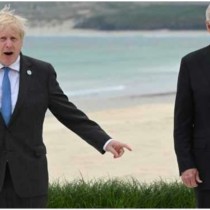
Geostrategic consensus' on China keeps US-UK relationship special
Biden’s relationship with the British Prime Minister got off to a rocky start before entering the White House when he belittled Johnson as a "physical and emotional clone” of Donald Trump. The populist ex-US president has barely paved the way for Johnson’s relationship with a Democratic successor — falsely claiming in 2019 that the British prime minister has been nicknamed "Britain’s Trump”.
Northern Ireland was expected to be Biden-Johnson’s flash point. Biden makes much of his (partly) Irish Catholic ancestry, so it was not surprising that the US embassy in London last week expressed "serious concern” about the growing dispute between the UK and the EU in Northern Ireland. Experts foresaw Biden would urge Johnson to uphold the Brexit deal as the prime minister seeks changes to address union grievances in the British province.
But after a meeting marked by lavish displays of shared priorities — as well as a Biden riff on the importance of the "special relationship” — journalists asked the prime minister if the president had raised alarm about Northern Ireland. Johnson said, "No, he’s got it.”
Washington ‘obsessed with China’
It’s not surprising that Biden avoided Northern Ireland because no major US interests are at stake, suggested Richard Whitman, a professor of politics and international relations at the University of Kent.
"The UK has not been as good as it could have been at explaining what it is trying to do – at using public diplomacy to remind Washington that the Republican community is not the only group in Northern Ireland with its own priorities. and views on how they keep peace,” he said. Nevertheless, Whitman emphasized, "this issue has been subject to a greater degree of magnification that it deserves.”
By contrast, the Biden’s focus on China can hardly be overstated. His administration emphasized from the outset that its international priority is the growing geopolitical rivalry with China. Hence, Washington’s G7 urges its European partners to join forces against Beijing.
"I don’t think people realize how important China is in everything Washington is doing now,” said Robert Singh, a professor of American politics at Birkbeck University in London. "It has become fashionable in some quarters to think that a new Cold War is nonsense and that it is reserved for foreign policy hawks; the remnants of neoconservatism. But I don’t buy that. Everyone you talk to in Washington is obsessed with China.”
UK hawkish
China also keeps many in Westminster busy. After the UK approached China as an export market and source of investment in early 2010 under then Prime Minister David Cameron, it carried out a volte-face.
The Tory backseat organization the China Research Group – founded in April 2020 by two influential Conservative MPs, Tom Tugendhat and Neil O’Brien – has pressured Johnson’s government to adopt an increasingly aggressive stance on China.
The pressure group quickly got the kind of change it wanted. Britain had given Chinese tech company Huawei a role in providing the country’s 5G infrastructure in early 2020, despite US protests. But the government reversed later that year, ordering telcos to stop installing Huawei 5G equipment by September 2021 and permitting plans to remove everything by 2027.
Then, the Integrated Review of Security, Defense, Development and Foreign Policy, published in March, set out a new long-term UK agenda – largely focused on countering China’s "systemic challenge to our security, prosperity and values” while climate change is seen as a potential area for cooperation with Beijing. The UK will "tilt towards the Indo-Pacific,” the report said.
Britain aims to provide the "widest and most integrated presence in the region” of any European country working closely with the US and the UK’s Asian and Oceanic allies, according to the Integrated Review. Accordingly, the UK announced in April that it will send its largest Royal Navy fleet deployment since the 1982 Falklands War to the Indo-Pacific.
"There is certainly a growing geostrategic consensus between the UK and the US, especially when it comes to China,” Whitman said. "And the British aviation group steaming east is showing Washington that London is coming with action, not just words.”
Britain’s radical overhaul of its China policy since Cameron’s years stems from a "certain degree of US following,” but even more of a "crystallization of British thinking,” Whitman continued. "The UK has come to the end of a long, hard look at its relationship with China. There has been a strong push for a tougher stance within the Conservative Party – but it is also parliamentary, with a significant part of the Labor Party agreeing that Britain should vigorously oppose China’s treatment of the Uyghurs, for instance.”
Germany’s ‘Geopolitical Constipation’
In light of this, it’s telling that Biden suggested to Johnson — not an EU leader — that democratic countries develop an alternative to China’s Belt-and-Road international infrastructure project in March.
The EU’s Chinese stance has differed significantly from the UK’s over the past year. A month after Biden defeated Trump, the European Commission announced a "Comprehensive Trade Agreement” with China. German Chancellor Angela Merkel was seen as the main architect of the deal, backed by French President Emmanuel Macron.
Critics of the agreement argued that – while influential companies such as German automakers would benefit – European leaders were naive about the strength of China’s forced labor and technology transfer obligations. Many in Washington were dismayed that the EU effectively turned down the incoming Biden administration’s call to consult with the new White House over Europe’s economic relations with China.
In May, the EU parliament suspended the deal after Beijing imposed sanctions on several MEPs and European researchers specializing in China.
"It was a big shock to the Brussels ring road when China introduced these sanctions,” Whitman said. However, there is still a "big gap between where the US is from versus China, where the UK is now, and where the EU stands,” he continued.
"Much EU thinking about China has focused on its emergence as an economic opportunity; there has been a lot of short-term and long-term wishful thinking,” Whitman added. "Germany in particular suffers from a kind of geopolitical constipation; it finds it very difficult to think geopolitically and has long seen China as just an export market, not an competitor.”
British financial services firms as well as German and French manufacturers have found a lucrative export market in China. But it has been "easier” for the UK government to subordinate economic interests to political interests, as it has new experience with this – having "already thrown the City of London under the bus” by pursuing a Brexit deal. excluding the financial sector from the European single market – argued Jacob Kirkegaard, a senior fellow at the German Marshall Fund.
‘A pattern that has been going on for decades’
Amid their agreement that China is much more of a competitor than an export market, it bodes well for the Biden-Johnson relationship that there is a rich history of US presidents and British prime ministers starting uncomfortably before getting closer because they come face to face for major international issues.
Tony Blair doubted he would bond with George W. Bush after having a close relationship with his predecessor on the other side of the American party divide, Bill Clinton—then Blair’s impassioned response to 9/11 heralded their shared "War on terror” in. . Similarly, George H.W. Bush was eager to continue Ronald Reagan’s famous friendship with Margaret Thatcher, favoring then-German Chancellor Helmut Kohl as his European special relations—until Saddam Hussein invaded Kuwait in the late 1990s and it was the Iron Lady who Bush leaned on for advice.
It’s a pattern that’s been going on for decades; Washington has had transitions since Bush Senior where London thinks it will lose to Berlin and Paris,” Singh said. "He thought Kohl was the person to bet on with German reunification; Thatcher was seen as the woman of yesterday. But then the US had to act and discovered that the UK was the most reliable ally.”
"Despite all the frictions and the UK’s declining activity in many areas, London is still useful to Washington in that way,” concluded Singh. "Biden never had a choice; Johnson has never had a choice: you just have to move on.”



 0
0 














Geostrategic consensus' on China keeps US-UK relationship special
Joe Biden and Boris Johnson met for the first time on Thursday ahead of the G7 summit, after many media discussions highlighted the White House's concerns about Northern Ireland and the president's past disdain for the prime minister. But a